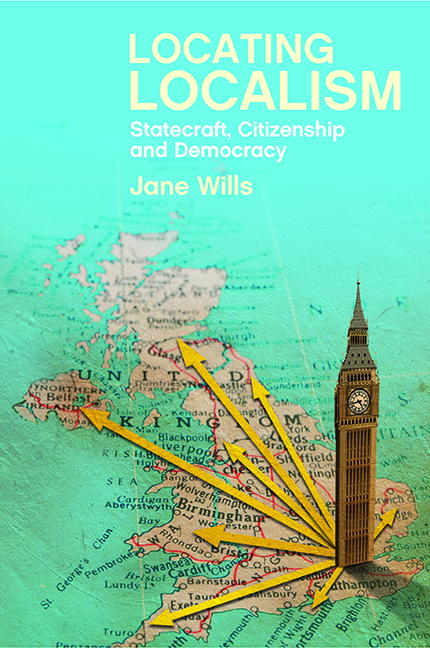Book contents
- Frontmatter
- Dedication
- Contents
- List of figures and tables
- Acknowledgements
- Introduction: the argument being made in this book
- one Making sense of localism
- two The geo-constitution and the long history of localism
- three The place of the people
- four Localist local government
- five Institution building for localist futures
- six Community organising: past, present and future
- seven A localist future?
- Appendix: Research design and methods
- References
- Index
five - Institution building for localist futures
Published online by Cambridge University Press: 05 April 2022
- Frontmatter
- Dedication
- Contents
- List of figures and tables
- Acknowledgements
- Introduction: the argument being made in this book
- one Making sense of localism
- two The geo-constitution and the long history of localism
- three The place of the people
- four Localist local government
- five Institution building for localist futures
- six Community organising: past, present and future
- seven A localist future?
- Appendix: Research design and methods
- References
- Index
Summary
The key plank of the localism policy agenda – the Localism Act (2011) – instituted new rights to neighbourhood planning. As indicated in Chapter One, this legislation has galvanised a new wave of self-organisation in communities across the country. Many hundreds of forums have been set up in urban areas where none existed before, and many hundreds of parish councils are also widening their civic networks to develop neighbourhood plans. In contrast to the state-led localisms being developed in Poplar and Lambeth (and examined in Chapters Three and Four), neighbourhood planning has stimulated community-led localism. Rather like the permissive legislation that was so important in stimulating early local government in England (see Chapter Two), the change in the law and the statutory powers granted to neighbourhood plans have provided a new opportunity for those who are able and willing to seize the opportunity to exercise greater control over what happens in their neighbourhood. In so doing, their work has generated stronger local social networks and greater civic capacity, with ideas for projects that potentially extend far beyond planning. As the government minister for neighbourhood planning put it towards the end of the Coalition government's period in office:
Of all the reforms that we’ve brought in this is the one which has the potential to completely transform our planning system, but perhaps more importantly than that, it can transform the relationships between communities and the change that happens in those communities … Of course it's still an acorn but it has the potential to actually establish a proper sense of community control over development and over the way the community changes. (Nick Boles, MP, when Minister for Planning (DCLG), speaking at an event about neighbourhood planning in Leeds, July 2014)
As you’d expect, some people and some areas are better resourced to undertake neighbourhood planning than others and the pattern of existing activity will reflect underlying variations in the geography of civil society and civic capacity (as explored in Chapter Three). This chapter looks at the development of neighbourhood planning in three different urban areas, none of which had previous experience of community-led planning (more information about the research is provided in the appendix at the end of this book).
- Type
- Chapter
- Information
- Locating LocalismStatecraft, Citizenship and Democracy, pp. 143 - 166Publisher: Bristol University PressPrint publication year: 2016



